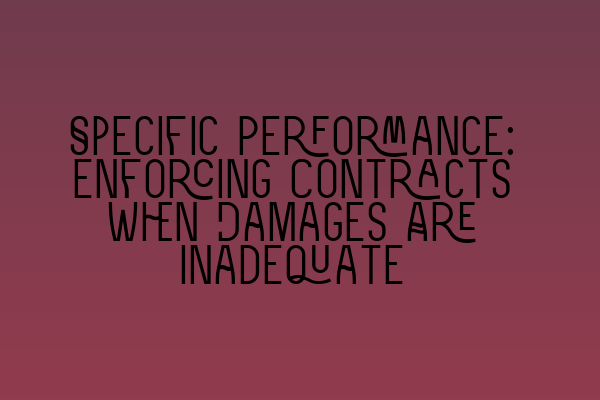Specific Performance: Enforcing Contracts When Damages Are Inadequate
Contracts are the backbone of any business transaction. They outline the rights and obligations of the parties involved and provide a sense of security in the agreement. However, there are times when one party fails to uphold their end of the bargain, leaving the other party at a loss. In such cases, damages might not be enough to compensate for the breach. That’s where the concept of specific performance comes into play.
Understanding Specific Performance
Specific performance is a legal remedy available to the injured party when monetary damages are inadequate or impractical. It is an equitable remedy that aims to enforce the contractual obligations of the breaching party rather than compensating the aggrieved party with money. Essentially, specific performance requires the breaching party to fulfill their contractual obligations as originally agreed upon.
Specific performance can be sought in situations where the subject matter of the contract is unique or rare, such as a one-of-a-kind artwork, a specialized piece of machinery, or a property with distinct features. In such cases, monetary compensation cannot adequately replace the unique value of the subject matter. Additionally, specific performance can also be requested when the injured party can demonstrate that monetary damages would be insufficient to put them in the position they would have been in had the contract been performed.
Requirements for Specific Performance
While specific performance can be a powerful remedy, it is not automatically granted in every case. Certain requirements must be met for a court to order specific performance:
- Valid and Enforceable Contract: The first requirement is that there must be a valid and enforceable contract in place. This means that all essential elements of a contract, such as offer, acceptance, consideration, and intention to be legally bound, must be satisfied.
- Mutuality of Remedy: The court will require that both parties are capable of performing their obligations under the contract. If one party is unable or unwilling to perform, the court is unlikely to grant specific performance.
- Inadequacy of Damages: The injured party must show that damages would be inadequate to compensate for the breach of contract. This could be due to the unique nature of the subject matter or the difficulty in valuing the loss monetarily.
- Feasibility: The court will consider whether specific performance is feasible and practical. If it would be unduly burdensome or impossible to enforce, the court may refuse to order specific performance.
The Discretion of the Court
It’s important to note that specific performance is not a guaranteed right. The court has discretion in deciding whether to grant this remedy based on the circumstances of each case. The court will consider factors such as the fairness of the remedy, the parties’ conduct, and whether specific performance is in the interests of justice.
In some instances, the court may grant specific performance but impose certain conditions or modifications to the original contract. These conditions are typically aimed at providing a fair outcome and balancing the rights of both parties. It is also worth mentioning that specific performance is an alternative remedy to damages and not an additional one.
Conclusion
Specific performance is a valuable legal remedy that allows the injured party to enforce the performance of a contract when damages are inadequate. It provides a means to ensure that parties honor their contractual obligations, especially in cases where the subject matter is unique or the loss cannot be adequately compensated with money alone. However, specific performance is not always granted, and the court has the discretion to assess the feasibility and fairness of the remedy.
If you are preparing for the SQE Contract Law exam and want to practice your knowledge, check out our SQE 1 Practice Exam Questions and SQE 1 Practice Mocks FLK1 FLK2. For comprehensive preparation for the SQE exams, we offer SQE 2 Preparation Courses and SQE 1 Preparation Courses. Stay informed about the latest SRA SQE Exam Dates by visiting our website regularly.
